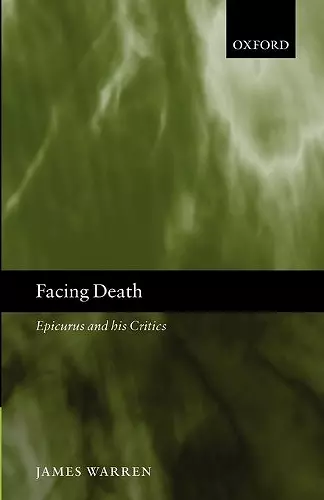Facing Death
Epicurus and his Critics
Format:Paperback
Publisher:Oxford University Press
Published:18th May '06
Currently unavailable, and unfortunately no date known when it will be back
This paperback is available in another edition too:
- Hardback£100.00(9780199252893)

The ancient philosophical school of Epicureanism tried to argue that death is 'nothing to us'. Were they right? James Warren provides a comprehensive study and articulation of the interlocking arguments against the fear of death found not only in the writings of Epicurus himself, but also in Lucretius' poem De rerum natura and in Philodemus' work De morte. These arguments are central to the Epicurean project of providing ataraxia (freedom from anxiety) and therefore central to an understanding of Epicureanism as a whole. They also offer significant resources for modern discussions of the value of death - one which stands at the intersection of metaphysics and ethics. If death is the end of the subject, and the subject can not be benefited nor harmed after death, is it reasonable nevertheless to fear the ceasing-to-be? If the Epicureans are not right to claim that the dead can neither be benefited nor harmed, what alternative models might be offered for understanding the harm done by death and do these alternatives suffer from any further difficulties? The discussion involves consideration of both ethical and metaphysical topics since it requires analysis not only of the nature of a good life but also the nature of personal identity and time. A number of modern philosophers have offered criticisms or defences of the Epicureans' views. Warren explores and evaluates these in the light of a systematic and detailed study of the precise form and intention of the Epicureans' original arguments. Warren argues that the Epicureans also were interested in showing that mortality is not to be regretted and that premature death is not to be feared. Their arguments for these conclusions are to be found in their positive conception of the nature of a good and complete life, which divorce the completeness of a life as far as possible from considerations of its duration. Later chapters investigate the nature of a life lived without the fear of death and pose serious problems for the Epicureans being able to allow any concern for the post mortem future and being able to offer a positive reason for prolonging a life which is already complete in their terms.
Review of hardback edition This book is what Epicureans and their critics, both hostile and sympathetic, have been waiting for. It is rare, indeed, to find a work that shows both a solid grasp of ancient texts, their proper philological interpretation and appreciation, and is at the same time clearly cognizant of the contemporary philosophical debates on the issues originally raised by our Greek sources. This is such a book and its publication will prove to be a milestone. * Lawrence Jost, Notre Dame Philosophical Reviews *
ISBN: 9780199297696
Dimensions: 216mm x 140mm x 14mm
Weight: 335g
252 pages